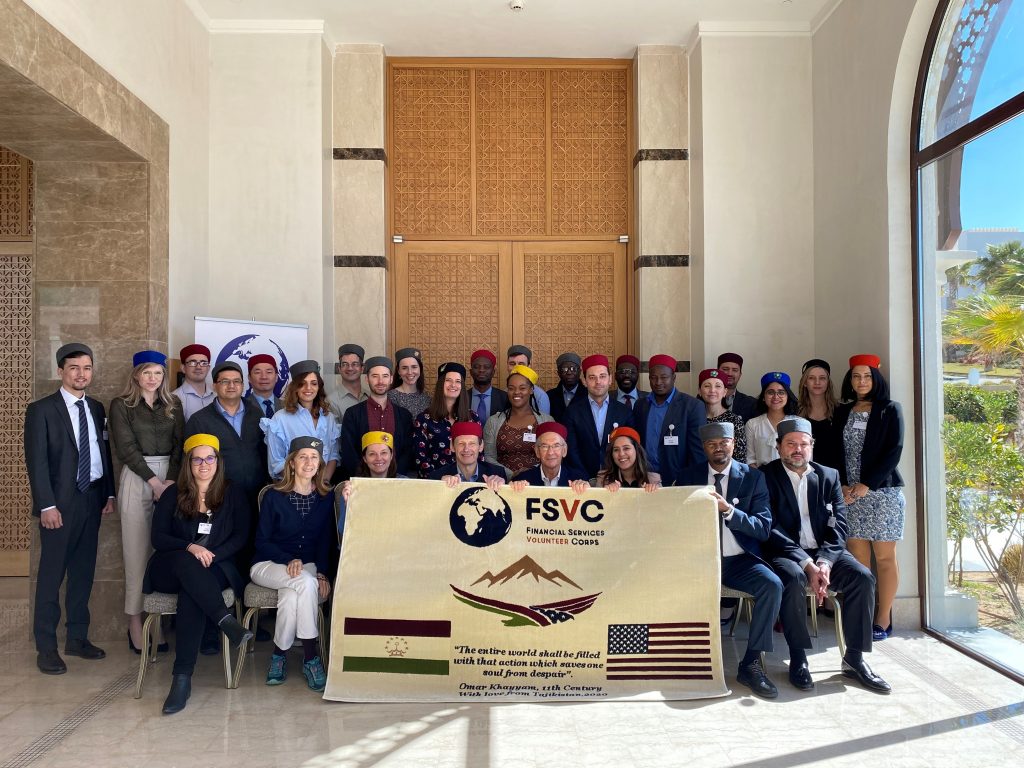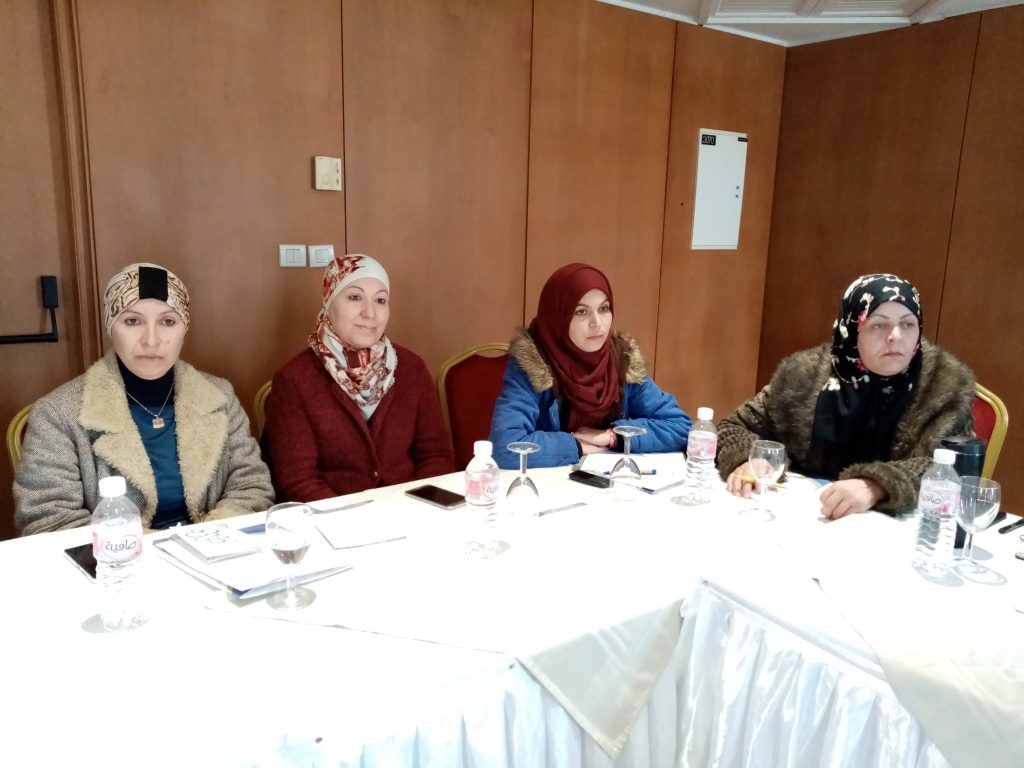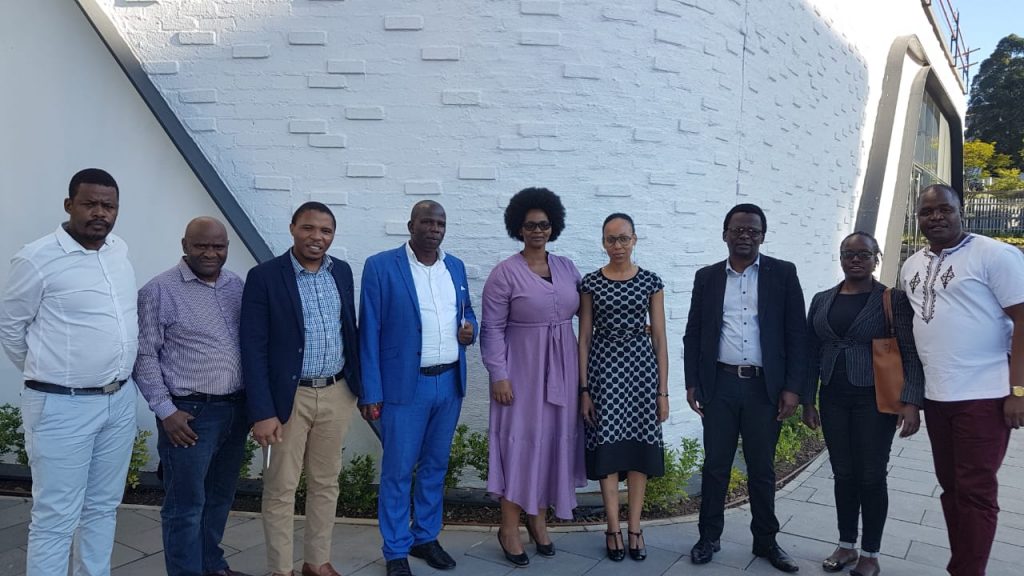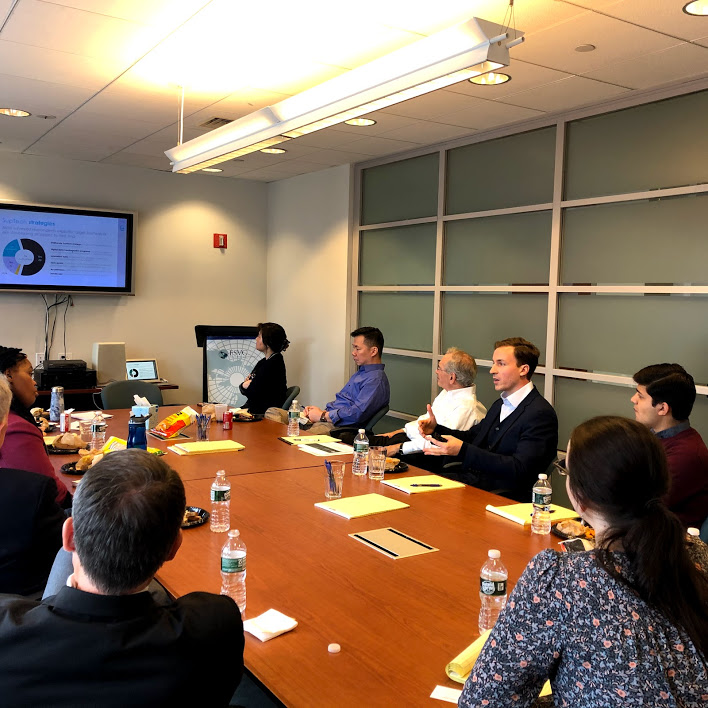#GivingTuesdayNow: Message from FSVC President & CEO

FSVC Vice Chairman Julian Schroeder, President & CEO Andy Spindler and FSVC global staff. Tunis, Tunisia, February 2020
Dear Members of the FSVC Community,
We are eager to share with you another report on FSVC’s ongoing work. During this extraordinary period in global history and FSVC’s life, all of us at FSVC have continued to work remotely, restructuring projects to deliver them virtually wherever possible and identifying emergency assistance that would be helpful to counterparts. Our field offices, also working remotely, have given us a unique vantage point for assessing current developments in the emerging market world.
One of the most striking features of this crisis is how unevenly it has unfolded across countries, and how uncertain its impact remains. Countries with the soundest financial infrastructure, and that are able and willing to remove some of the uncertainty about the pandemic’s true course within their borders, are likely to have the easiest time weathering the economic storm that will grow in intensity over the coming months. Countries whose financial sectors are characterized by more transparency, stronger institutional frameworks, and more capacity are likely to deal more effectively with the economic disruption as they move toward recovery. FSVC is playing a valuable role in assisting financial authorities in emerging market countries in these challenging circumstances, helping to meet a significant need at a time when the resources of international financial institutions are stretched to the bone.
This is an urgent time for extending expertise and a helping hand across international boundaries to those in need. The pandemic is another reminder of how dependent we all are on each other. FSVC is in the financial bridge-building business, and our work takes on new meaning as the emerging market world struggles to counter the damaging
economic and financial effects of the pandemic. As FSVC responds to this crisis, your support means more than ever to our efforts . We are glad you have joined us in this endeavor, and you are an essential part of our community.
Thank you. Stay safe and healthy!
Andy
J. Andrew Spindler
President & CEO
Tunisia: Strengthening the Local Business Community

Women entrepreneurs in the Northwest Region. Beja, Tunisia, February 2020
In 2019, with support from the U.S. Department of State’s Middle East Partnership Initiative (MEPI), FSVC launched a project to build the capacity of the Chambers of Commerce (CoCs) of the Northwest, Southeast and Southwest regions of Tunisia to serve as major drivers of local development and investment within their communities.
As part of this project, FSVC worked with the CoCs to draft a strategic plan prioritizing short-term actions and activities to foster synergies with other business support organizations and develop export-oriented services for local entrepreneurs. FSVC also organized a series of working sessions with women entrepreneurs to ensure that a gender-sensitive approach is included in the strategic plan of each CoC. In total, 97 women entrepreneurs that work in the agribusiness, para-pharmaceutical and industrial sectors had the opportunity to share their expectations on how the CoCs can help them grow their businesses.
As a result of FSVC’s technical assistance, the CoCs will become financially sustainable and operationally more efficient. The CoCs will also be a strong resource to local small businesses, especially women entrepreneurs, by providing them meaningful tools and services, including small grants and community networking events. By increasing their engagement with small businesses and supporting them, CoCs will strengthen the entrepreneurial ecosystem in the interior and southern regions of Tunisia, thereby increasing the economic activity and opportuni ties in these regions.
Eswatini: Increasing Budget Transparency

Members of the Eswatini Parliament during an FSVC workshop. Mbabane, Eswatini, February 2020
With support from the U.S. Agency for International Development (USAID), FSVC has been implementing a technical assistance program in Eswatini to combat corruption by increasing budget transparency and oversight. As the last absolute monarchy in Africa, Eswatini has a government structure in which budgetary power is heavily concentrated within the executive branch.
Over the past three years, FSVC has been working with Parliament, the Supreme Audit Institution and civil society organizations to strengthen budget accountability, oversight and advocacy on behalf of citizens. FSVC’s program has been particularly well-received by participants, many of whom had previously received little to no training on international best practices in public financial management. After a recent workshop for the Eswatini Senate, the Deputy President, Mr. Ndumiso Mdluli, stated: “This workshop has empowered us to ask the right questions. We will now be scrutinizing with ease of conscience all budget documents because we have learned a lot from this workshop. On behalf of all Senators, I would like to thank USAID and FSVC.”
The International Budget Partnership has just published the results of its 2019 Open Budget Survey, and FSVC is pleased to report that Eswatini has increased its score in budget transparency from 3/100 in 2017 to 31/100 in 2019. It has also increased its budget oversight score from 37/100 to 39/100. These results mark a positive trend in Eswatini, as various government institutions are becoming more aware of and knowledgeable about their role. FSVC is proud of the progress that Eswatini has made on public financial management, and grateful to all the high-level volunteer experts who have donated their time and services in this program.
FSVC Roundtable on Regtech and Suptech

Arend Kulenkampff (second from right) and FSVC representatives. New York, NY, March 2020
In March, FSVC organized a roundtable with Arend Kulenkampff, Consulting Associate with BFA Global. BFA is a consulting firm that uses finance, data and technology to develop regtech and suptech solutions to help build inclusive and competitive economies.
Mr. Kulenkampff explained various concepts related to financial innovation, including the difference between regtech (or comptech), which focuses on reducing compliance-related costs for the private sector, and suptech, which supports regulators. With the rise of big data, the quantity of data generated that supervisors are expected to monitor is growing disproportionately. Furthermore, many countries have outdated legacy systems that rely heavily on manual processes and paperwork. Suptech solutions have the potential to reduce massively time spent on data cleaning, enabling staff to focus instead on data analysis. As a relatively new sector, suptech is in its early stages of evolution, offering the potential to generate many solutions to support regulators.
The conversation then moved to identifying areas of complementarity and potential synergies between FSVC and BFA. While FSVC works with regulators in several emerging market countries to build staff capacity at all levels and help adopt international best practices in various areas of supervision, BFA can support regulators by designing IT solutions to automate some of their work and processes. The roundtable concluded on the importance of collaboration between different technical assistance providers to maximize impact on counterparts and beneficiaries.